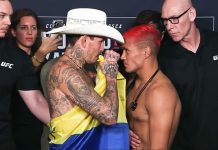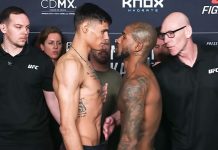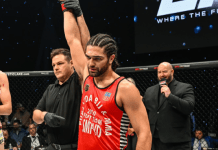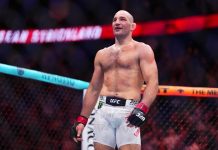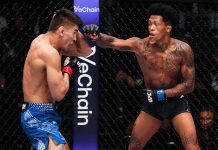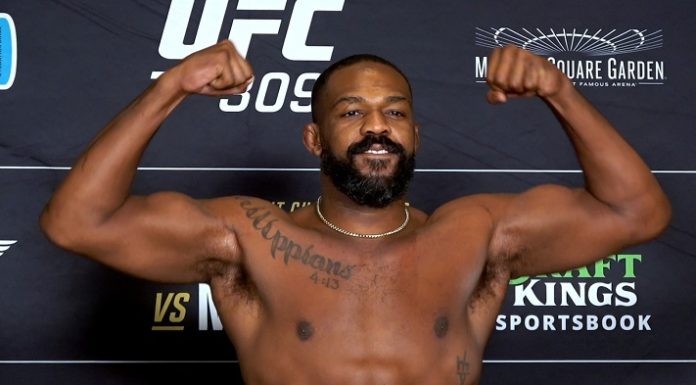
The relation between the marketing of misogyny and Greg Hardy:
MMA is a hyper-aggressive full-contact combat sport which started out as a product for a very aggressive, primarily male audience. However with time the sport has grown a sizeable female fanbase. Something to consider when signing a fighter like Hardy.
The original audience is usually comprised of people who prefer to watch flashy knockouts. If you look at the history of the sport, the majority of fans have been apathetic to the kind of person who enters the cage. There have been fighters like Rich Franklin, who was a math teacher, then the likes of Jorge Masvidal, a street fighters. The audience didn’t care about the background of the fighter, only about results.
However, when you look at the modern section of the fanbase which associate themselves with Greg Hardy you notice a few things. These fans aren’t supporting him because of his performance in the cage, they don’t care about his football career but what matters to them, in their language, is “triggering the snowflakes”.
Now, this phrase is a tool used in the packaging of the product misogyny. We covered it earlier. Almost all of Greg Hardy’s fans today support him not because of his achievements, which in MMA are negligible, but because of the accusations against him. Greg Hardy is a way for them to get back at the “unfair” treatment they’re facing at the hands of movements like #MeToo. He becomes a symbol for a group which gets to hide their hate and fear behind the man.
Hardy, and by the looks of it even the UFC, is well aware of this. So criticism of him is defended against aggressively. For instance, when some journalists (including Ariel Helwani) pointed out that having Greg Hardy and Rachael Ostovich (a domestic violence victim) on the same card was a bit insensitive, Dana White retorted “I don’t give a sh*t what Ariel Helwani thinks. Who the f*ck is Ariel Helwani to question anything we do? I think we’ve done a pretty good job in 20 years, I could give a sh*t what he thinks, or anybody else for that matter. If you’re that type of douche-y … whatever you want to call him, you can make something out of anything. He’s on the roster, she’s on the roster. They’re eventually gonna line up on a card sometime. If you’re that type of reporter, you’d have something to say about it.”
It’s in this way that those calling out Hardy or the promotion doing business with him become “haters.” The promotion is suddenly under attack (victim mentality). If you point out that Hardy’s actions in the cage were wrong, he’s the victim again. Case in point, while talking about his DQ to Allen Crowder loss, Hardy said “I was in shell-shock sitting there just thinking in my head ‘what did I do’ I was just mad at myself. Now looking back it was probably best for my career.”
Using an inhaler between rounds? Hey he’s the victim there too, he didn’t know any better. He’s green. Ask yourself this: were it not for Hardy’s behavior outside the octagon, would he even be there, and able to make such a silly decision while competing in what is supposed to be the pinnacle of the sport?
Hardy may be leading the charge when it comes to the marketing of misogyny, but he’s far from alone. Popular fighters like Khabib Nurmagomedov and Conor McGregor aren’t very far behind.
Why are they being catered to?
There are actual fans of Greg Hardy. But why are they being catered to? The obvious answer is money. But specifically, marketing a fighter like Greg Hardy targets those people in society who are ready to be angry. Ready to respond to a problem they don’t really have. In this sense, they don’t belong to a particular race, religion or as a matter of fact even gender. They have nothing in common apart from insecurities, making them vulnerable and easier to capture as an audience.
What makes hate such a powerful marketing tool is that anger demands to be shared, whereas peace is quiet and content. When people are angry, their analytical faculties shut down. They are hitting that share button before they can even objectively consider the issue!”
– Leveraging Hate: The Marketing Tool of the Future
Another important aspect of promoting a fighter like Hardy is that people love to hate them. Hardy’s past makes him unlikable to many, thus if people get an opportunity to see him go down or get knocked out, they will tune in. That means no matter what, the UFC isn’t losing audience. It’s win-win for them, financially. But in the end, Hardy still wins here. The same goes for fighters like Colby Covington. In fact, one of the major reasons why the Khabib-McGregor feud was bought into so widely is because McGregor used hate as tool. His personal attacks made him so unlikable that people simply tuned him to see him get a beating of a lifetime.
Hate is a powerful tool. It can be used to reap a whole lot of money if you market it properly. Out of their hate for movements like feminism, people will dole out plenty of cash for athletes like Hardy (and others thinking they’re doing the right thing, will dole out cash in the hopes of seeing him get any sort of punishment). Out of hate for the concept of equality, people will pay to watch someone like Colby Covington. Out of hate for other’s beliefs and thoughts, people will for sure pay for something like Khabib-McGregor. And if they don’t hate the movement but instead hate the fighters promoting it, they’ll tune in to watch just to see someone they hate get knocked out. Either way, the fighter and the promotion wins.



